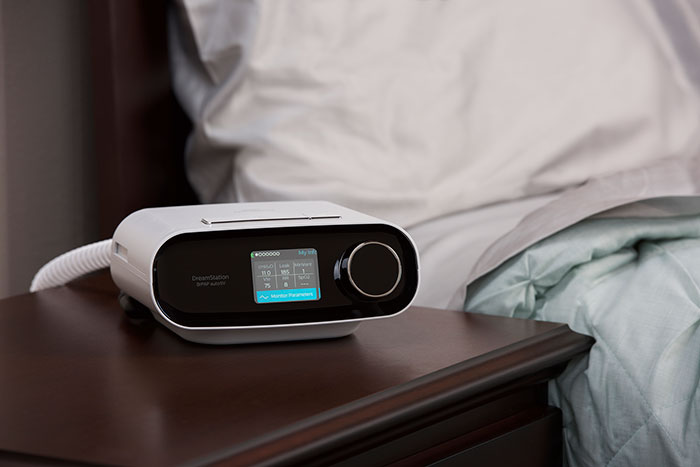Mar 13, 2019
New study finds significant differences in how various adaptive servo ventilation (ASV) devices treat complex sleep apnea
Using Philips PAP solutions, results resurface conversation around ASV therapy use for complex sleep apnea and its potential to improve quality of life
Amsterdam, the Netherlands – Royal Philips (NYSE: PHG, AEX: PHIA), a global leader in health technology, today announced results from a recent study, Comparison of Physiological Performance of Four Adaptive Servo Ventilation Devices in Patients with Complex Sleep Apnea in the American Journal of Respiratory and Critical Care Medicine, showing adaptive servo ventilation (ASV) is an effective treatment option for patients with complex sleep apnea (CompSA). This study compared the performance of four different ASV devices with different algorithms, including Philips DreamStation BiPAP autoSV, and the ASV device that was originally associated with greater mortality during a prior SERVE-HF trial published in 2015. The recent study revealed that certain physiological performances were quite different across the devices, which may explain the previously noted SERVE-HF trial results. Sleep apnea affects millions of people worldwide, with many of these individuals living with CompSA – a sleep disorder that’s a combination of obstructive and central sleep apneas [1]. Despite the number of people impacted, the proper therapy is not always available or introduced as an option to patients with CompSA. In the prior SERVE-HF trial, it was suggested that ASV therapy was harmful to central sleep apnea patients with heart failure, with limited information suggesting that some of the patients in the trial may have received excessive minute ventilation that may have increased patient mortality [2]. This Philips-funded randomized controlled study suggests the mechanisms underlying the adverse effects of ASV may be secondary to excessive ventilation due to device-based effect rather than a class-effect [3].
As a science company, we are obligated to understand why and how ASV in the SERVE-HF trial can be associated with increased risk of mortality in patients with central sleep apnea and severe heart failure.
Dr. Teofilo Lee-Chiong
Chief medical liaison at Philips
“The pursuit for scientific understanding of various disease and treatment processes is an iterative process where we revisit successes and failures to deepen our understanding of disease processes,” said Dr. Sairam Parthasarathy, a lead investigator on the study, professor of medicine and interim chief of Division of Pulmonary, Allergy, Critical Care and Sleep Medicine at University of Arizona College of Medicine. “It’s imperative we keep this in mind and re-visit previous studies when technological advancements show promise for a certain type of therapy. Today, ASV isn’t used in certain clinical settings due to safety concerns associated with the therapy in patients with congestive heart failure and predominantly central sleep apnea. Now, through devices with smarter algorithms, providers can potentially ensure that patients are getting the right treatment and thereby improve treatment approaches in patients with complex or central sleep apnea.” “Philips provides healthcare professionals and patients with innovative treatment solutions and services. The safety of patients who use our devices is our top priority. We also wish to maximize the benefits that patients receive from using our technology,” said Dr. Teofilo Lee-Chiong, chief medical liaison at Philips. “As a science company, we are obligated to understand why and how ASV in the SERVE-HF trial can be associated with increased risk of mortality in patients with central sleep apnea and severe heart failure. Future research is needed to confirm if excessive ventilation during wakefulness and sleep due to device-specific ASV algorithms can result in potentially life-threatening consequences, especially in patients with heart failure.” This Philips-sponsored study expands on Philips’ commitment and leadership in sleep apnea care. Philips' Dream Family of sleep apnea solutions focuses on connecting and supporting the patient, clinician and homecare provider to enhance patient care and quality of life. For additional information on Philips’ PAP offerings and additional solutions for sleep and respiratory care, follow @PhilipsResp or visit www.philips.com. [1] https://www.sleepapnea.org/learn/sleep-apnea-information-clinicians/ [2] https://www.nejm.org/doi/full/10.1056/NEJMoa1506459 [3] https://www.atsjournals.org/doi/pdf/10.1164/rccm.201807-1303LE
About Royal Philips
Royal Philips (NYSE: PHG, AEX: PHIA) is a leading health technology company focused on improving people's health and enabling better outcomes across the health continuum from healthy living and prevention, to diagnosis, treatment and home care. Philips leverages advanced technology and deep clinical and consumer insights to deliver integrated solutions. Headquartered in the Netherlands, the company is a leader in diagnostic imaging, image-guided therapy, patient monitoring and health informatics, as well as in consumer health and home care. Philips generated 2018 sales of EUR 18.1 billion and employs approximately 77,000 employees with sales and services in more than 100 countries. News about Philips can be found at www.philips.com/newscenter.
Topics
Contacts

Kathy O'Reilly
Philips Global Press Office Tel.: +1 978-221-8919
You are about to visit a Philips global content page
Continue
Meredith Amoroso
Philips Global Press Office Tel: +1 724-584-8991
You are about to visit a Philips global content page
ContinueMedia assets


